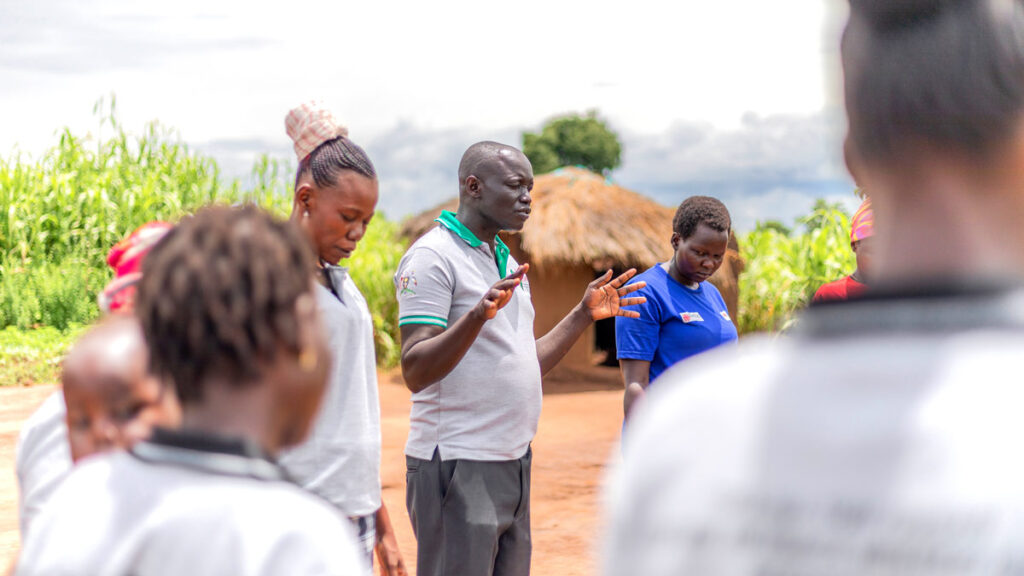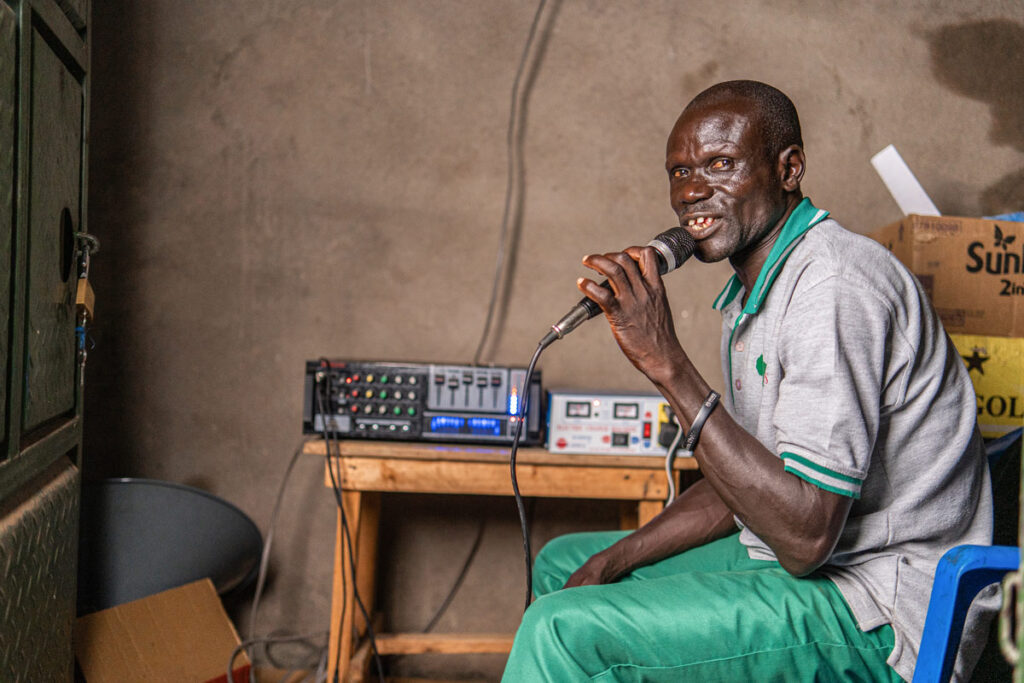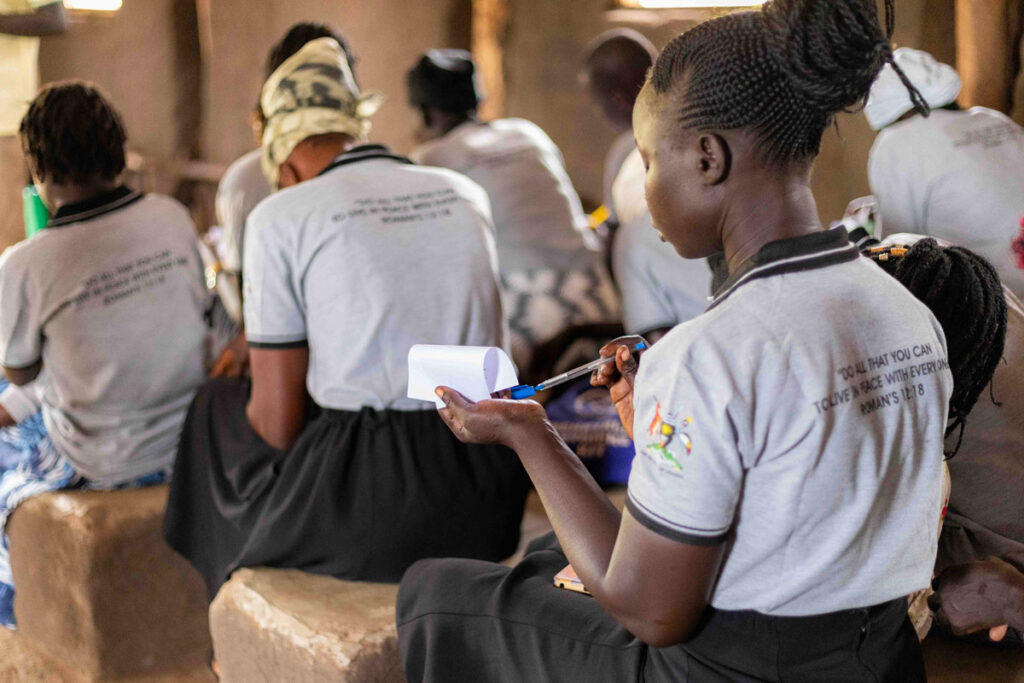Partnership makes peace possible
Where years of war make it tempting to give up on peace, our local partner Sam Malish explains why he keeps going.
Photo: Sam Malish longs for South Sudanese refugees to find peace and hope in Jesus
In one of the largest refugee settlements in the world, where people have fled from years of civil war, it would be easy to give up on peace. CMS local partner Sam Malish explains why he continues to work for peace by making disciples of Jesus.
I come from Yei in South Sudan, but have been in exile for seven years. I serve with an organisation called Across that transforms lives and communities in refugee camps in north western Uganda – in Bidibidi, Imvepi and Rhino camps.
My calling is in children’s ministry, but I also felt called to work with families, so we started a biblical approach of trauma healing, where we use Bible stories to bring healing to those that are hurting.
People need peace
We now work in Bidibidi 2, which hosts around 40,000 refugees. Bidibidi camp has five zones, hosting more than 250,000 refugees in total. We’ve worked here for a year, and our fellow refugees are going through tough times. Food [provision] has been reduced, and there’s not enough land to cultivate.

People have gone through lots of violence back home in South Sudan. And they are still experiencing that pain. Families are hurting. We have reports of violence to children and to women. Couples are separating and there is loneliness. Women who are widows need people to help them and there’s no one there.
People need peace. Across is trying to help them through trauma healing work and also livelihood activities. Though we have other needs to be satisfied, to me, peace is number one. We need peace so we can enjoy other things.
A family conflict
The conflict in South Sudan started in 2013 and has left many people homeless. Refugees had to flee because they witnessed the killing of their relatives and the looting of their resources. Many people have been seeking refuge in Uganda since 2016. Back in South Sudan, in the areas that refugees have come from, there is still conflict. People are still being killed. They can’t go back.

The war in South Sudan is similar to a family conflict, because the people killing the South Sudanese are not people from other nations, but the South Sudanese themselves. This has caused a lot of pain in the lives of refugees.
War in South Sudan has gone on for a very long time, since Sudan was one country and war broke out in 1955. Many people have lost hope that there will be peace. But I still believe one day South Sudan will be stable and there will be a lasting peace. And that peace will only come from God. Since peace is at the heart of God, God desires that people live in peace.
Sharing healing
We started trauma healing work with children’s ministry workers in 2018, helping them to identify trauma in children and to use therapeutic stories and play. Then we came up with another approach, to use Bible stories to teach women who are church workers. Through these stories the women first heal their traumas, then they share the peace and comfort they have from God with their neighbours. It has been a powerful tool within the refugee settlement promoting peace, healing and hope.

We have three approaches: training church workers face to face, using digital audio players participants can take home and play to families and neighbours, and broadcasting messages over community radios. The camp is big, so audio players and radio help us to share our messages of peace and healing more widely.
In the trauma healing sessions, we cover six Bible stories. We begin with the story of Joseph, who was betrayed by his own family. It applies so much to the story of the South Sudanese, so participants in the training identify with it easily.
When we tell the story of the resurrection, we do an exercise in which participants think about their pain. Jesus has come to take away the pain, to take away our sin, to restore the peace we have lost. And we have a role to play, which is demonstrated by writing down the issues. Then we come together and burn the paper to show that it is over. We have a number of healing activities throughout the sessions, but this one is special because it demonstrates forgiveness, healing and repentance.
Forgiveness is very important in trauma healing, because some of the pain people have is to do with relationships that are hurting. When people forgive each other, the relationship becomes healthy, there is peace and trauma will reduce.
“I rejoice with God”
Many people are being healed from their pain. Each of the workers we have trained can share stories of transformation. Some women told us that their husbands, who are not believers, saw the peace they have and now their family has peace and they go together to church.
We are just training people – it is God who gives peace.
I feel happy that the work God is doing through us is bringing peace in families. I feel happy when the Word of God is sinking deeper into the hearts of the people. I rejoice with God, having seen the fruits of his work through us.
When I see people who were pushed to the edges, who were losing their hope, get back their hope and live in harmonious relationships with God and others, I feel happy.
My vision is to see many families live in peace, for people to experience peace with God and peace with each other. For this to happen, we have to train more church workers – the 230 we have trained are a very small percentage.
Partnering for peace
Being South Sudanese, having to leave because of the same war and finding myself in the refugee camp, working with my fellow refugees, means a lot to me. It means we are the solution for our own problem. God can use us to bring healing.
The work God is doing involves many people in different ways. One is through the practical things we do on the ground. But there are also people outside the camp, outside Uganda, praying for us and giving financial support. Without that, we could not do the work. I want to thank CMS for standing with the church in Africa in prioritising peace. I know that peace cannot be achieved without partnerships.
Peace is at the heart of God. Jesus is the Prince of Peace. Scripture tells us that the peace that he gives is different from the peace that the world gives (John 14:27). And I believe that the peace Jesus gives is the true peace.
There are times when we can feel like giving up. But praise be to Jesus. The Scriptures we have learned encourage us never to give up because Jesus has not given up on us. And that gives us the hope to not give up, even if we are pressed to the edges.
Photo: “We must know how to forgive; if there is forgiveness there
will be peace in our country…” says South Sudanese refugee Lilias